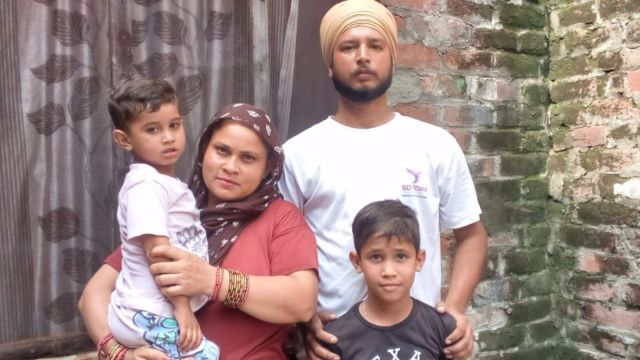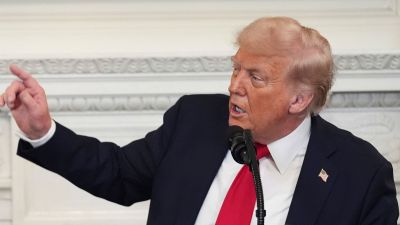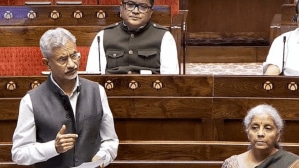‘I was denied a job, my father was labelled a terrorist: Son of Punjab cop killed in 1993 fake encounter says 4 generations have suffered
Charanjit Singh, son of fake encounter victim Surmukh Singh, says he doesn't know about the movie 'Punjab '95', based on the life of human rights activist Jaswant Singh Khalra, who fought against such encounters.
 Sarmukh Singh’s son Charanjit Singh with his family. (Express Photo)
Sarmukh Singh’s son Charanjit Singh with his family. (Express Photo)In the wake of former Punjab Police officer Paramjit Singh’s sentencing in the fake encounter case, Charanjit Singh, son of Surmukh Singh, one of the victims of the encounter, has talked about his struggles, including facing rejection for a police job due to the stigma surrounding his father, who was falsely labelled a terrorist.
A Central Bureau of Investigation (CBI) court in Mohali Wednesday sentenced former Beas station house officer Paramjit Singh, 68, retired superintedent of police, to 10 years’ imprisonment and imposed a fine of Rs 50,000 for the abduction and custodial killing of two Punjab Police constables—Surmukh Singh of Muchhal village (Baba Bakala) and Sukhwinder Singh of Khiala village (Amritsar)—in a fake encounter in 1993.
“I was born after the murder of my father, Surmukh Singh. My mother took me to my maternal great-grandparents. She got remarried and my maternal grandparents raised me,” said Charanjit, who met his paternal grandfather only in his mid-teens.
Human rights activist Jaswant Singh Khalra was the first to uncover that the bodies of the two constables had been cremated as “unclaimed bodies” by the Punjab Police. On September 6, 1995, Khalra himself was allegedly abducted from his home, tortured, and killed in a similar fake encounter. His wife, Paramjit Kaur Khalra, subsequently approached the Supreme Court, requesting an investigation into how many such bodies were cremated in Punjab as “unclaimed”.
Acting on records compiled by Khalra, the court directed the CBI to conduct an investigation that led to the conviction of Paramjit Singh. It took over three decades for the court to reach a verdict. As one family member said, “Delayed justice has left its own scars behind.”
 Late S. Sarmukh Singh. (Express Photo)
Late S. Sarmukh Singh. (Express Photo)
Charanjit recounted that his grandfather never spoke of the case directly but hinted at a possible police job through a contact, Paramjit Singh, now convicted for his father’s killing. “Actually, my grandfather father knew Paramjit Singh, who has now been convicted for the fake encounter of my father. I couldn’t understand the meaning of it at that time,” Charanjit said.
He alleged that Paramjit Singh promised a job in exchange for withdrawing the CBI case. In 2012, during a police recruitment drive, Charanjit cleared all the physical and medical tests. “I was told that I cannot be given a job because my father was a terrorist. They told me that I was the son of a terrorist, so I cannot be given the job. My grandfather and I were devastated. First, they snatched my father and his dignity and then my job,” he said.
Although he had passed the medical and written tests, he was rejected at the counselling stage. Following that, Paramjit Singh stopped responding to the family’s calls.
Human rights activist Sarabjit Singh Verka, who pursued the case, said, “Paramjit Singh not only killed Surmukh Singh but also the hopes of his son Charanjit Singh. He was not the son of a terrorist. He was eligible for the job, but the police report was against him. Because Paramjit Singh had killed his father, tagging him as a terrorist.”
Charanjit Singh said, “We didn’t get any compensation. Our four generations have suffered due to Paramjit Singh. My grandfather suffered. He spent his whole life seeking justice. He also tried to compromise on justice in the hope that I would be able to live a good life and my children wouldn’t have to suffer the poverty as I did.”
‘Family emotionally shattered’
Now working as a private driver earning Rs 12,000 per month, Charanjit says the injustice has left his family emotionally and economically shattered. “We were from a Dalit family. My father’s job was a great source of hope to help us recover from poverty. His murder and the stigma that came with it pushed us back from where my father had started,” he said.
Sukhwinder Singh, the second constable killed in the alleged encounter, also belonged to a Dalit family. He was unmarried and, according to relatives, the first in the family to get a government job.
“My grandfather had great expectations from him,” said Amritpal Singh, nephew of Sukhwinder Singh. “But he was killed in a fake encounter, and after that, my grandfather spent all his life seeking justice.” His grandfather passed away in 2015, without seeing the case come to a conclusion. “He couldn’t wait for justice to deliver,” Amritpal Singh added.
When asked if he knew about Jaswant Singh Khalra, Charanjit Singh said, “My grandfather had told me that Jaswant Singh Khalra had come to our home. But I don’t know much.”
‘Punjab ’95’, the film based on the life and death of Khalra, starring Punjabi singer and actor Diljit Dosanjh, has remained stuck with the censor board for more than two years.
Asked about the movie, Charanjit Singh said, “I don’t know about the movie. I am a driver. I don’t know much about what is happening around. I have to raise my children. I want to give them what I missed all my life. I demand that the government give me commendation and dues. I also want my job back, which was denied to me because they tagged my father as a terrorist.”
“We will try to get the compensation to both families. Both victims were in police jobs, and they had bright futures ahead. Both families suffered as a result of this fake encounter. Paramjit Singh lived his life with all the salaries and dues. But these families were denied everything,” said lawyer Verka.












